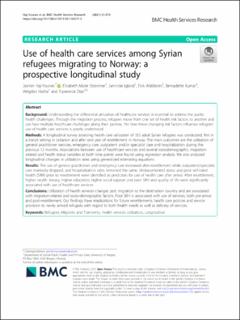| dc.contributor.author | Haj-Younes, Jasmin | |
| dc.contributor.author | Strømme, Elisabeth Marie | |
| dc.contributor.author | Igland, Jannicke | |
| dc.contributor.author | Abildsnes, Eirik | |
| dc.contributor.author | Kumar, Bernadette | |
| dc.contributor.author | Hasha, Wegdan Hamed Nasser | |
| dc.contributor.author | Diaz, Esperanza | |
| dc.date.accessioned | 2021-08-20T11:44:19Z | |
| dc.date.available | 2021-08-20T11:44:19Z | |
| dc.date.created | 2021-07-15T18:15:53Z | |
| dc.date.issued | 2021 | |
| dc.identifier.issn | 1472-6963 | |
| dc.identifier.uri | https://hdl.handle.net/11250/2770578 | |
| dc.description.abstract | Background
Understanding the differential utilization of healthcare services is essential to address the public health challenges. Through the migration process, refugees move from one set of health risk factors to another and can face multiple healthcare challenges along their journey. Yet how these changing risk factors influence refugees’ use of health care services is poorly understood.
Methods
A longitudinal survey assessing health care utilization of 353 adult Syrian refugees was conducted; first in a transit setting in Lebanon and after one year of resettlement in Norway. The main outcomes are the utilization of general practitioner services, emergency care, outpatient and/or specialist care and hospitalization during the previous 12 months. Associations between use of healthcare services and several sociodemographic, migration-related and health status variables at both time points were found using regression analysis. We also analyzed longitudinal changes in utilization rates using generalized estimating equations.
Results
The use of general practitioner and emergency care increased after resettlement while outpatient/specialist care markedly dropped, and hospitalization rates remained the same. Undocumented status and poor self-rated health (SRH) prior to resettlement were identified as predictors for use of health care after arrival. After resettlement, higher health literacy, higher education, higher social support and poor SRH and quality of life were significantly associated with use of healthcare services.
Conclusions
Utilization of health services changes post migration to the destination country and are associated with migration-related and socio-demographic factors. Poor SRH is associated with use of services, both pre-arrival and post-resettlement. Our findings have implications for future resettlements, health care policies and service provision to newly arrived refugees with regard to both health needs as well as delivery of services. | en_US |
| dc.language.iso | eng | en_US |
| dc.publisher | BioMed Central | en_US |
| dc.rights | Navngivelse 4.0 Internasjonal | * |
| dc.rights.uri | http://creativecommons.org/licenses/by/4.0/deed.no | * |
| dc.title | Use of health care services among Syrian refugees migrating to Norway: a prospective longitudinal study | en_US |
| dc.type | Journal article | en_US |
| dc.type | Peer reviewed | en_US |
| dc.description.version | publishedVersion | en_US |
| dc.rights.holder | Copyright 2021 The Authors | en_US |
| dc.source.articlenumber | 572 | en_US |
| cristin.ispublished | true | |
| cristin.fulltext | original | |
| cristin.qualitycode | 2 | |
| dc.identifier.doi | 10.1186/s12913-021-06571-5 | |
| dc.identifier.cristin | 1921902 | |
| dc.source.journal | BMC Health Services Research | en_US |
| dc.identifier.citation | BMC Health Services Research. 2021, 21 (1), 572. | en_US |
| dc.source.volume | 21 | en_US |
| dc.source.issue | 1 | en_US |

